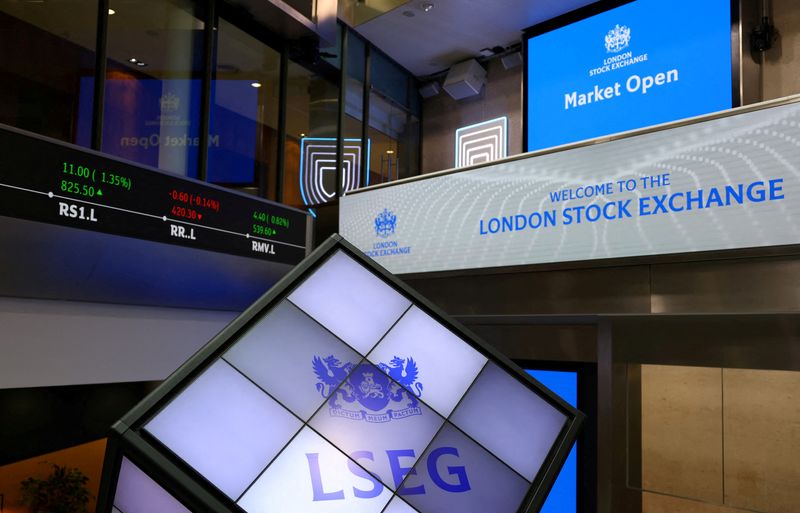By Elizabeth Howcroft
LONDON (Reuters) -European stocks were struggling for direction in early trading on Thursday as traders waited for key inflation data, while markets were also on alert for signs of Japanese authorities intervening in the yen after further declines in the currency.
Shares fell and bond yields spiked in Asian trading as investors became nervous jittery following a surprise jump in inflation data in Australia on Wednesday and in Canada on Tuesday.
At 0811 GMT, the MSCI World Equity index was down 0.1%.
The pan-European was up by less than 0.1%, steadying after two days of declines.
London’s was a touch lower, but was up 0.2%.
Traders are waiting for Friday’s U.S. personal consumption expenditures (PCE) data, which is the U.S. Federal Reserve’s preferred inflation measure and could help traders determine the outlook for the Fed’s interest rate.
France, Italy and Spain will also release inflation data on Friday.
Fiona Cincotta, senior markets analyst at City Index, said markets were cautious.
“No one’s really going to be wanting to take any large positions ahead of tomorrow’s inflation data,” she said.
“In Europe you’ve got the political uncertainty which is also limiting any upside ahead of the French elections,” she added.
The first round of French parliamentary elections will take place on Sunday.
Euro zone government bond yields were up at their highest in two weeks. The benchmark German 10-year yield was up 3 basis points at 2.476%.
The risk premium on French debt was near a seven-year high as markets worried about the risk of far-right or far-left parties winning the elections.
U.S. Treasury yields were also up, with the up 3 basis points at 4.3411%.
Expectations for U.S. rate cuts have been pushed back by stubborn inflation and strong economic data. U.S. jobless claims data are due later in the session.
“If we get lower than expected jobless claims that could really add fuel to the fire that the Fed may not even cut rates this year,” City Index’s Cincotta said.
Elsewhere, euro zone bank lending data showed lending stuck near multi-year lows.
YEN WATCH
The Japanese yen was near to its weakest in 38 years versus the U.S. dollar, keeping markets on alert for any sign of intervention.
The dollar-yen pair was trading at 160.57, with the yen having strengthened slightly since the pair’s peak of 160.88 on Thursday.
Japanese Finance Minister Shunichi Suzuki said he would take any necessary action on currencies, and that Japanese authorities are “deeply concerned” about the effect of the yen’s drop on the economy.
ING said in a note that authorities may have an incentive to wait until after Friday’s U.S. PCE data before intervening.
“Should US data fuel more USD strength, then intervention would become almost inevitable – but with the new line in the sand potentially closer to 165,” ING FX strategist Francesco Pesole wrote.
The was a touch lower on the day at 106. The euro was up by less than 0.1% at $1.0685.
The Swedish crown weakened after Sweden’s central bank held its key interest rate at 3.75% as expected and said it could cut rates two or three times in the second half of the year, if the inflation outlook remained the same.

Oil prices were a little higher, with futures up 0.5% at $85.65 a barrel. U.S. West Texas Intermediate crude futures were up 0.4% at $81.26 per barrel.
Gold was up 0.2% at $2,2303.3.

No comments:
Post a Comment